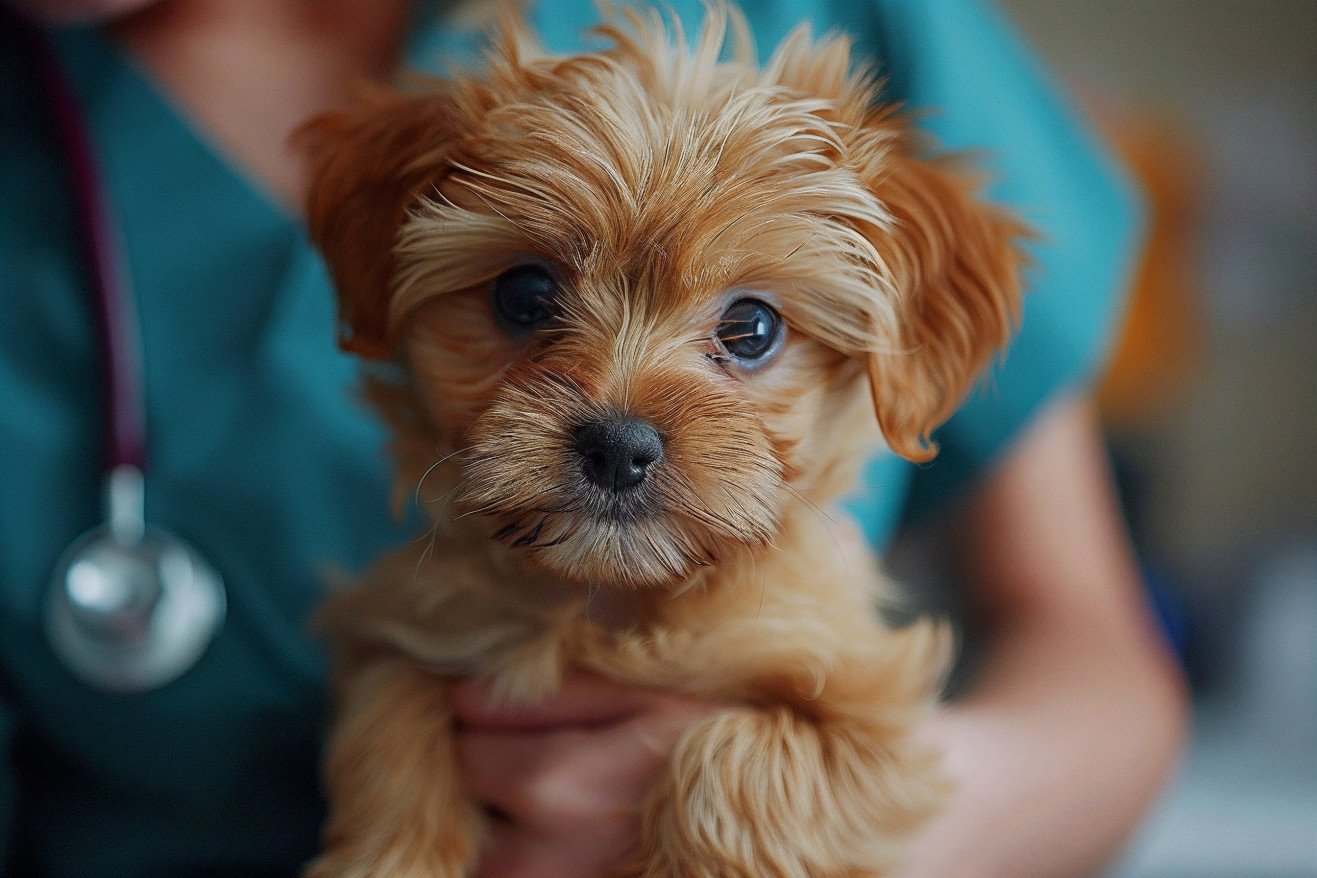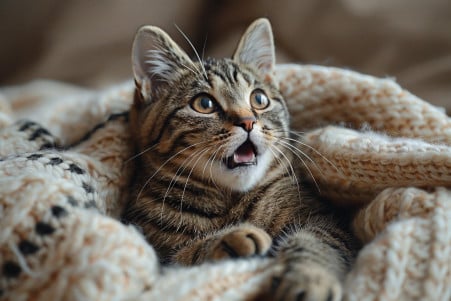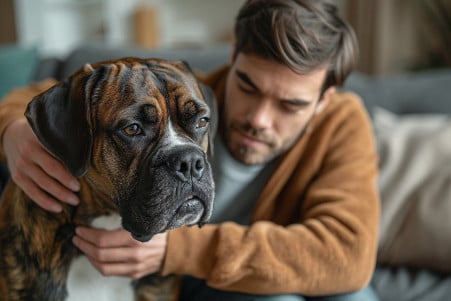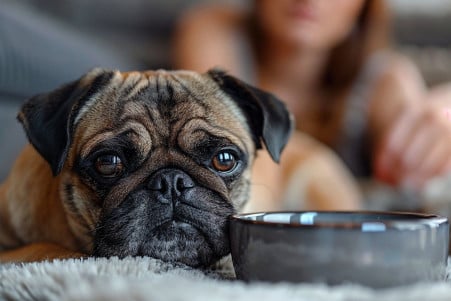How to Get Rid of Puppy Hiccups: Home Remedies and When to Call the Vet
29 May 2024 • Updated 28 May 2024

Puppy hiccups are normal and usually nothing to worry about, but if they won’t go away or seem to be causing your puppy distress, there are a few things you can do to help. Give your puppy a few sips of water, massage their chest, or give them a toy or treat to help them change their breathing pattern and stop the hiccups. Make sure to keep your puppy calm, as excitement can make hiccups worse.
While these suggestions can help with occasional episodes, if your puppy has persistent hiccups, it may be a sign of an underlying issue that needs to be addressed by a vet. We'll cover the potential reasons for ongoing hiccups, when it may be time to see a vet, and home remedies that can help alleviate these mysterious puppy spasms. You can help your puppy feel better with a few simple tricks.
Can home remedies help get rid of puppy hiccups?
Causes and Triggers of Puppy Hiccups
Puppy hiccups are often caused by common things like eating or drinking too quickly, excitement, or digestive issues. The diaphragm muscle spasms, closing the glottis and causing that distinctive "hic" sound. Puppies' immature digestive systems mean they are more likely to get hiccups than adult dogs.
Other things that commonly cause hiccups are changes in temperature, stress, tiredness, or overexertion from exercise. One idea is that hiccups help puppies exercise the muscles they need to breathe that they developed in the womb. Although hiccups and reverse sneezing may seem similar, reverse sneezing is caused by irritants in the soft palate, not diaphragm spasms.
Hiccups can also be caused by certain foods, a sudden change in diet, or eating too quickly, all of which can upset a puppy's stomach and lead to hiccups. To help prevent hiccups, you can create a peaceful environment, use slow feeder bowls, and gradually introduce new foods. Although they are typically nothing to worry about, if your puppy's hiccups are persistent, they could be a sign of an underlying issue that needs to be addressed by a vet.
Home Remedies to Help Puppy Hiccups
wikiHow explains that giving your puppy a small sip of water can sometimes help stop hiccups by breaking the hiccup reflex. Rover.com says that gently massaging your puppy's chest and belly can help relax the diaphragm and move the hiccups along.
FirstVet says that you can also try to distract your puppy with a toy or treat to change their breathing pattern and end the hiccups. They also suggest light exercise or a leisurely walk to help regulate your puppy's breathing and end the cycle of hiccups.
It's also important to keep your puppy calm and avoid overstimulation, as Rover.com warns that stress can make hiccups last longer. Finally, Dogster says that a small amount of honey or maple syrup can help relax the diaphragm. However, it's important to use these remedies in moderation, as they contain sugar, which isn't good for puppies in large quantities.
While these home remedies can help, if your puppy's hiccups are happening frequently or lasting for a long time, it's best to consult your vet.
When to Get Veterinary Help for Puppy Hiccups
While some puppy hiccups are normal, if your puppy's hiccups last longer than an hour or happen frequently, it could be a sign of an underlying issue that needs to be addressed by a vet. PetMD explains that if your dog has prolonged or chronic hiccups, it could be a symptom of other issues like megaesophagus, respiratory problems, or digestive disorders.
The Orlando Vets blog says that if your dog's hiccups are accompanied by other symptoms like irregular breathing, distress, or anything else that seems out of the ordinary, you should take them to the vet. TPLO Info also says that if your dog's hiccups last longer than an hour, you should take them to the vet, as it could be a sign of a more serious issue.
It can be helpful for your vet if you keep a log of when your dog's hiccups happen and how long they last, says the Fairfield, NJ Vets. By taking an active approach and getting professional help, you can make sure that your puppy's hiccups aren't a sign of a larger issue that needs to be treated. Most puppies can overcome hiccups with time and proper care as their bodies grow and develop.
How to Prevent Puppy Hiccups
Per PetCube, slow feeder bowls and smaller, more frequent meals can help prevent puppy hiccups by controlling their food intake and slowing down their eating. The Kennel Club also says that keeping a calm environment and avoiding situations that could cause stress or excitement can help prevent puppies from getting hiccups.
Pawlicy Advisor says that regular exercise can help regulate breathing and prevent hiccups, but warns against making sudden changes to a dog's diet. Meanwhile, GoodRx says that feeding or exercising a dog right after a meal can cause hiccups.
The Kennel Club notes that puppies may grow out of hiccups as their digestive systems develop. By following these tips, you can help reduce the frequency of puppy hiccups and make sure your pet is happy and healthy.
Conclusion: Everything You Need to Know About Puppy Hiccups
Puppy hiccups are a common and usually harmless occurrence, often caused by factors like rapid eating, excitement, or an immature digestive system. Simple home remedies like offering water, gentle chest rubs, and using distractions can provide relief. However, persistent or frequent hiccups may signal a more serious problem that requires veterinary evaluation.
By learning about the causes, experimenting with effective home remedies, and understanding when to get help from a vet, you can help your puppy get through this mysterious and sometimes uncomfortable condition. With the right care and preventive measures, most puppies will grow out of frequent hiccups as they mature. If you have any ongoing concerns about your puppy's hiccups, talk to your vet.


